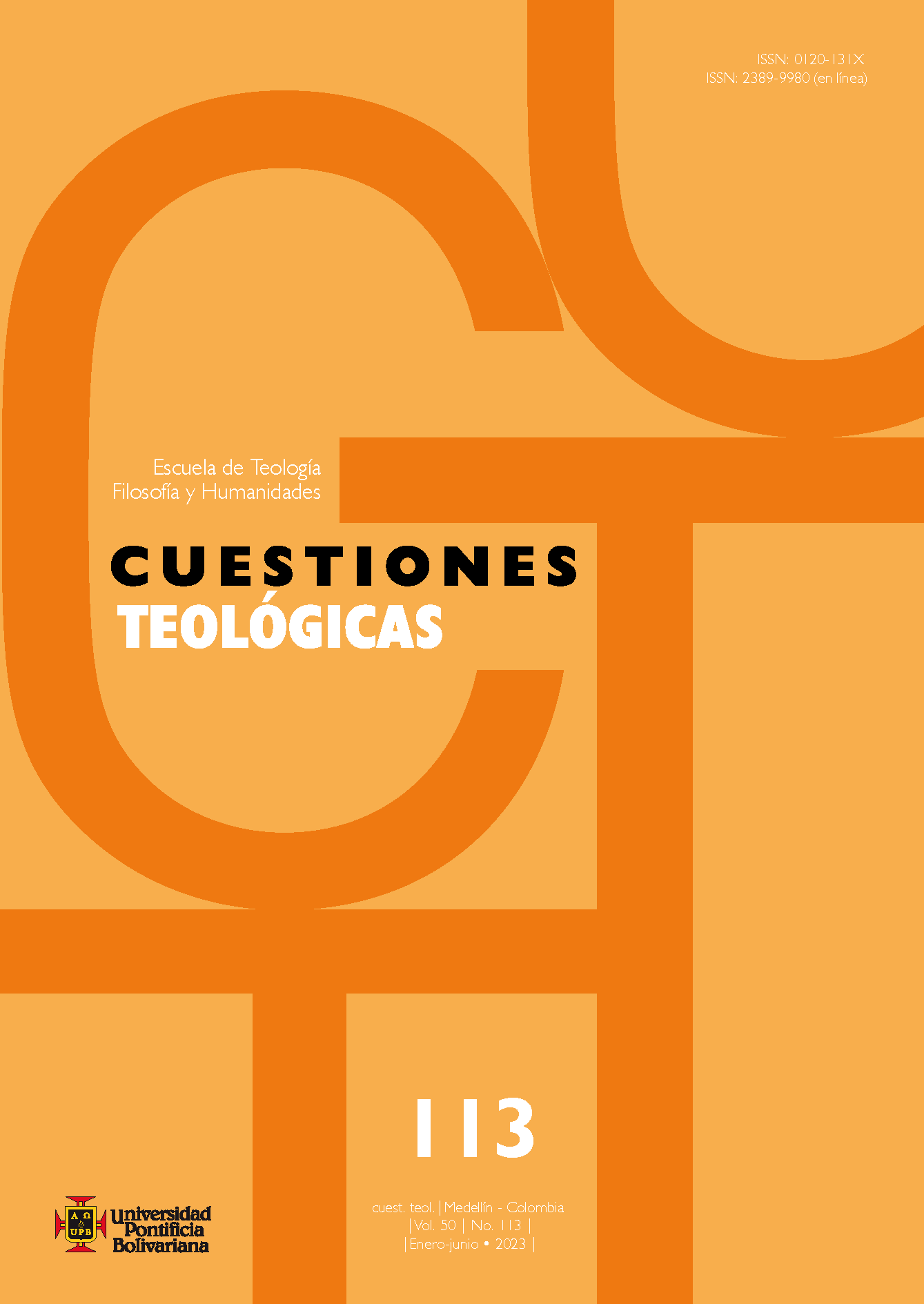Spiritual Hunger and the Search for God in Augustine’s Confessions: A New ‘Sensory’ Approach to the Text-Audience Interaction
Main Article Content
Abstract
This article investigates the role of sensory metaphors of food and hunger in the communicative project of the Confessions. Under the broad framework of cognitive poetics, which focuses on the interaction between text and audience, I analyse how sensory language contributes to an appeal to the readers’ sensory imaginations and emotions that they might be responsive to the viewpoint put forward by the text. I find that Augustine stimulates and reorientates especially his Manichaean readers’ intuitive but also cultural and familiar conceptions of the sensible world in relation to God, of their religious food and dietary rituals and, by extension, of their experience of God. This, I argue, seems to be a persuasive device to encourage new interpretation of the senses as signs which point towards immaterial reality, and new understanding of man’s relationship to God as utterly transcendent and unchangeable.
References
Ashbrook Harvey, S. (2006). Scenting Salvation. Ancient Christianity and the Olfactory Imagination. Berkeley/Los Angeles: University of California Press. https://doi.org/10.1525/california/9780520241473.001.0001
Baguette, C. (1970). Une période stoïcienne dans l'évolution de la pensée de saint Augustin. Revue des études augustiniennes 16, pp. 47-77. https://doi.org/10.1484/J.REA.5.104183
Barrett, J.L. (2019). What Do We Think about God When We Aren’t Careful?. In Slone, D.J. and McCorkle, W.W. (Eds.), The Cognitive Science of Religion. A Methodological Introduction to Key Empirical Studies (pp. 15-24). London: Bloomsbury. https://doi.org/10.5040/9781350033726.ch-002
Bermon, E. (2016). Phantasia, phantasma. In Dodaro, R., Mayer, C., and Müller, C. (Eds.), Augustinus Lexikon 4(5/6) (pp. 712-716). Basel: Schwabe.
Boyer, P. (1994). The Naturalness of Religious Ideas. A Cognitive Theory of Religion. Berkeley: University of California Press. https://doi.org/10.1525/9780520911628
Cox Miller, P. (2009). The Corporeal Imagination. Signifying the Holy in Late Ancient Christianity. Philadelphia: University of Pennsylvania Press. https://doi.org/10.9783/9780812204681
Cruz, de, H. (2014). Cognitive Science of Religion and the Study of Theological Concepts. Topoi 23(2), pp. 487-497. https://doi.org/10.1007/s11245-013-9168-9
Czachesz, I. (2007). The Transmission of Early Christian Thought: Towards a Cognitive Psychological Model. Studies in Religion/Sciences Religeuses 36(1), pp. 65-83. https://doi.org/10.1177/000842980703600104
Drecoll, V.H. and Kudella, M. (2011). Augustin und der Manichäismus. Tübingen: Mohr Siebeck.
Dupont, A. (2018). Mystical Experiences and Mystical Theology in Augustine of Hippo? A Reconsideration of the Sources (conf. 9, an. quant. 33, doctr. chr. 2). Medieval Mystical Theology 27(1), pp. 36-59. https://doi.org/10.1080/20465726.2018.1472416
Fédou, M. (2018). Sens corporels et sens spirituels: l’héritage patristique. Gregorianum 99(2), pp. 293-314.
Ferrari, L. (1978). The ‘Food of Truth’ in Augustine’s Confessions. Augustinian Studies 9, pp. 1-14. https://doi.org/10.5840/augstudies197897
Harrison, C. (2019). On music, sense, affect and voice. London: Bloomsbury. https://doi.org/10.5040/9781501326295
Jacobs, G. (2022). Augustine of Hippo: Advocate of Scriptural Metaphor. Cuestiones Teológicas 49(112), pp. 1-21. https://doi.org/10.18566/cueteo.v49n112.a04
Kotzé, A. (2004). Augustine's Confessions. Communicative Purpose and Audience. Leiden/Boston: Brill. https://doi.org/10.1163/9789047405696
Lootens, M.R. (2012). Augustine. In Gavrilyuk, P.L. and Coakley, S. (Eds.), The Spiritual Senses. Perceiving God in Western Christianity (pp. 56-70). Cambridge: Cambridge University Press. https://doi.org/10.1017/CBO9781139032797.006
Mazzeo, J.A. (1962). St. Augustine’s Rhetoric of Silence. Journal of the History of Ideas 23(2), pp. 175-196. https://doi.org/10.2307/2708154
Moncion, L. (2016). Erotic Food Metaphors in Augustine’s Confessions. The Heythrop Journal 57, pp. 653-658. https://doi.org/10.1111/heyj.12135
Morton, A. (2013). Emotion and Imagination. Cambridge/Malden: Wiley.
Olmsted., W. (2000). Invention, Emotion, and Conversion in Augustine’s Confessions. In Jost, W. and Olmsted, W. (Eds.), Rhetorical Invention and Religious Inquiry. New Perspectives (pp. 65-86). New Haven: Yale University Press. https://doi.org/10.12987/9780300147520-007
Oort, van, J. (2022). A New Reading of Augustine’s Conversion Story (conf. 8.13-30). Revue d’études augustiniennes et patristiques 68, pp. 45-100. https://doi.org/10.1484/J.REA.5.133191
Piras, A. (2018). Sealing the Body: Theory and Practices of Manichaean Ascetism. RRE 4, pp. 28-44. https://doi.org/10.1628/rre-2018-0004
Stenger, J.R. (2019). Text Worlds and Imagination in Chrysostom’s Pedagogy. In de Wet, C.L. and Mayer, W. (Eds.), Revisioning Chrysostom. New Approaches, New Perspectives (Critical Approaches to Early Christianity, 1) (pp. 206-246). Leiden: Brill. https://doi.org/10.1163/9789004390041_007
Stockwell, P. (2020). Cognitive Poetics: An Introduction. Second edition. New York: Routledge. https://doi.org/10.4324/9780367854546
Toom, T. (2016). Augustine’s hermeneutics. The science of the divinely given signs. In Toom, T. (Ed.), Patristic Theories of Biblical Interpretation. The Latin Fathers (pp. 77-108). New York: Cambridge University Press. https://doi.org/10.1017/CBO9781107588967.004
Tsur, R. (2002). Aspects of cognitive poetics. In Semino, E. and Culpeper, J. (Eds.), Cognitive Stylistics. Language and Cognition in Text Analysis (Linguistic Approaches to Literature 1) (pp. 279-318). Amsterdam: Benjamins. https://doi.org/10.1075/lal.1.14tsu
Upal, M.A. (2010). An Alternative View of the Minimal Counterintuitiveness Effect. Journal of Cognitive Systems Research 11(2), pp. 194-203. https://doi.org/10.1016/j.cogsys.2009.08.003
van Geest, P. (2010) “Sensory perceptions as a mandatory requirement for the via negativa towards God. The skilful paradox of Augustine as mystagogue”, in Baun, J., Cameron, A., Edwards, M. ans Vinzent, M. (Eds), Augustine and his opponents (Studia Patristica 49) (pp. 200-208). Leuven: Peeters.
van Geest, P. (2011). The Incomprehensibility of God: Augustine as a Negative Theologian. Leuven: Peeters.
Vanspauwen, A. and Dupont, A. (2022). Studying Manichaeism in Augustine’s Sermones ad populum: Crypto-Manichaeism and the Audience’s Theology. Cuestiones Teológicas 49(112), pp. 1-22. https://doi.org/10.18566/cueteo.v49n112.a06






